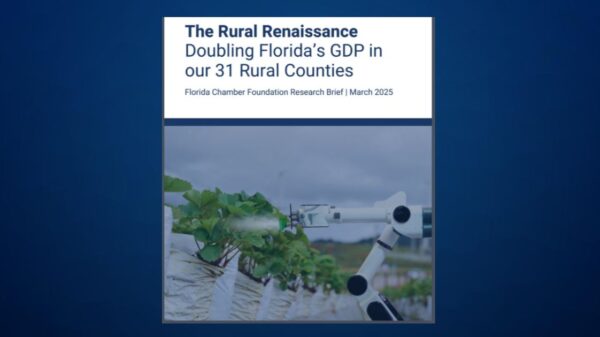Florida officials are citing a new report from the International Trade Commission (ITC) on how squash and cucumber imports impact seasonal markets in the U.S..
U.S. Sen. Marco Rubio, R-Fla., weighed in on the report last week.
“U.S. domestic production of cucumbers fell 826,000 metric tons to 636,000 metric tons between 2015 and 2020. The market share held by U.S. growers declined from approximately 50 percent to 40 percent during that same time period, despite the U.S. consumption of cucumbers rising by 24.3 percent. Meanwhile, the volume of cucumber imports from Mexico increased from 652,312 metric tons to 789,175 metric tons. Similarly, the volume of squash imports from Mexico increased from 349,320 metric tons in 2015 to 474,603 metric tons in 2020, while the market share held by U.S. growers declined,” Rubio’s office noted.
“The reports make clear what we have known for years,” Rubio said. “High-volume fruit and vegetable imports flooding in from Mexico are severely harming American growers and jeopardizing our food security. The Biden Administration must implement immediate, effective, enforceable, and durable remedies to combat unfair trade practices and defend America’s domestic sources of food in the winter and spring months.”
On the other side of the aisle, Florida Agriculture Commissioner Nikki Fried also weighed in on it.
“The ITC reports confirm unfair practices have fueled the explosive growth of Mexican fruit and vegetable imports resulting in grave harm to American producers, demonstrating a clear need for the federal government to provide timely and effective relief for impacted farmers in Florida and other seasonal crop states,” Fried’s office noted.
Back in April, she testified before the ITC and shared data from the Florida Department of Agriculture and Consumer Services (FDACS) “showing a surge in foreign imports of fresh and chilled cucumbers and squash, predominantly from Mexico, has caused an estimated 2,721 lost jobs, $944 million in lost cash receipts, and $1.85 billion in negative economic impact for Florida’s domestic produce growers since 2015.” Fried’s information was included in the new data.
“The ITC directly cited the FDACS findings in its official reports on squash and cucumbers, validating the continued findings by the Department as to continued harmful impacts of unfair foreign trade on the domestic industry, with its most recent report finding a nearly $4 billion economic impact on Florida due to Mexican imports alone,” Fried’s office noted.
“The ITC reports confirm what our Department’s reports have long shown and what Florida’s seasonal producers have long felt: unfair trade practices being employed by Mexico and others are devastating the domestic market, putting local farmers out of business and risking the security of our domestic food supply,” said Fried. “While Florida has been the hardest hit and Mexico has been the worst offender, seasonal producers across the United States are being impacted by similar unfair trade perpetrated by several foreign markets. This harm is also not isolated to our squash and cucumber growers, as a large number of other domestic perishable produce sectors have sustained similar, if not greater, harm due to Mexico’s unrelenting volume increases.
“The ITC reports are just the latest economic studies that have shown the devastating trend of surging imports costing the domestic market and risking the domestic food supply,” ried continued. “The need could not be more clear and the timing could not be more urgent for the federal government to use all tools available to enact an effective and enforceable action plan to stem the onslaught of these imports and the unfair trade and labor practices being employed by foreign competitors. The survival of our domestic industry and the security of our food supply are at stake.”
“Our U.S.-grown food supply is at risk,” said Mike Joyner, the president of the Florida Fruit & Vegetable Association. “Skyrocketing imports of Mexican fruits and vegetables due to unfair trade practices continue to cripple growers in the Southeast. While we commend the International Trade Commission for working to help solve this longstanding and growing threat to the Southeast produce industry, now is the time to act. Immediate, effective, swift relief is needed to give our Florida produce growers a future and ensure that a U.S.-grown produce supply is available to American families during the fall, winter and spring months of the year.”
At the end of summer, Fried and the FDACS released a report “showing 10-20 percent in annual lost sales of Florida seasonal producers because of expanded Mexican imports, resulting in an overall economic impact of $1.99 to $3.99 billion” which “equates to between 17,870 to 35,741 Florida jobs lost.”
Back in October, Rubio led members of the Florida congressional delegation in a letter to President Joe Biden urging the administration to protect Florida’s seasonal fruit and vegetable growers from unfair trade competition.
Joining Rubio were U.S. Sen. Rick Scott, R-Fla., and U.S. Reps. Gus Bilirakis, R-Fla., Vern Buchanan, R-Fla.,Kat Cammack, R-Fla.,Charlie Crist, D-Fla.,Mario Diaz-Balart, R-Fla.,Neal Dunn, R-Fla.,Carlos Gimenez, R-Fla.,Al Lawson, D-Fla., Brian Mast, R-Fla., Stephanie Murphy, D-Fla., Bill Posey, R-Fla.,John Rutherford, R-Fla.,Maria Elvira Salazar, R-Fla.,Darren Soto, D-Fla., Greg Steube, R-Fla.,Michael Waltz, R-Fla., Debbie Wasserman Schultz, D-Fla., and Frederica Wilson, D-Fla.




















